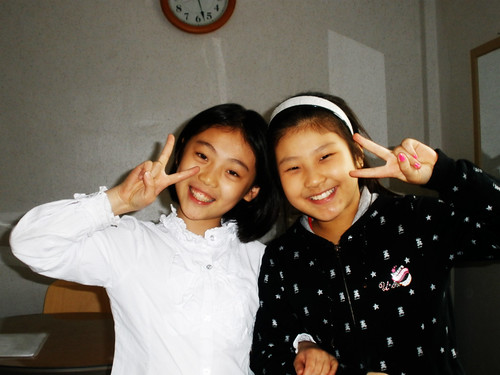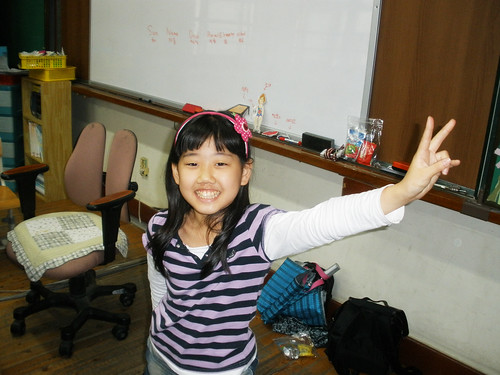
There are truths universally acknowledged: a single man in possession of a good fortune must be in want of a wife and fourth graders are adorable. I teach third through sixth grade, but fourth and sixth grade are my favorite. I have a rotating group of fourth grade girls assigned to clean my classroom (no janitors in Korea, they use the children instead). Half of them hate it because my classroom is always a mess (although hopefully my new policy of if-I-see-you-throwing-things-in-my-class-you're-staying-late-to-clean will help with that), but the other half love it because it means fun times with the English teacher. Also, sometimes I give them candy.

This is 예림 and 유지. 예림 (Ye Lim, English name: Tiffany) is on the left. 유지 (Yu Ji, English name: Alice) is on the right. They don't actually like cleaning the English room, but they love to come by my office after school. We talk, usually about makeup (which they are obsessed with and I am woefully uninformed about) and I let them play games (usually about makeup) on my computer. I justify it by making them explain the rules to me in English and they make it worth my while by showing me a Fair Isle knitting game on Naver (Korean Google).

This is 윤주 (Yun Ju, English name: Judith). She is easily one of my best students of any grade. I am constantly taken aback by how *advanced* her English is. She's all quiet and demure in class and then - bam! - she breaks out a fully formed, grammatically complex sentence. With the rest of my fourth graders, I'm just happy if their sentences have a noun AND a verb. She used 'widow' in conversation one day and when I asked how she knew the word, she told me it was because she's reading the Bible in English.

Only girls are assigned to clean the classrooms, which, of course. Korea? A patriarchal society? What makes you say that? (The boys do have chores, but they're assigned things like crossing guard duty in the morning, not cleaning.) 강석 is the one and only boy in the cleaning rota and it's only because he was shanghaied. The poor kid was just walking down the hallway one day, minding his own business, when a group of girls rushed out, grabbed him, drug him into the English classroom and put him to work. He was a good sport about it.

재희 loves to teach me Korean. She usually stick with nouns, things in the classroom she can point to. I have learned to words for pencil (연필), pencil sharpener (연필 깎개), scissors (가위), eraser (지우개) and window (창문) a hundred times. She's always super excited when I write anything in Hangul (Oh Teacher, very good job!) and together we cover the whiteboard with writing. On the board, you can see the day's vocabulary: sun (해), name (이름), desk (책상), the name of my school, table (서탁), dog (개), girl (소녀), phone (전화) and radio (라디오).

On Friday, my cleaning crew discovered that there are some English board games in the back of the classroom. We never use them because the classes are too big (a 4-6 player game in a class of 38 doesn't work well), but they're great for a couple of 4th graders. The girls chose Boggle Jr. which was perfect for them. The fourth graders are just starting to learn to read and write, and since the curriculum completely ignores phonics, I jumped at any chance to teach it. (I have a big long rant about phonics and how they don't exist in the public school curriculum. I think I understand where they're coming from. The Korean English teachers are often woefully unqualified to teach English and phonics are confusing, especially if your native writing system is a one-letter-one-sound-no-exceptions system like Hangul, but if the children don't learn to sound out words, their only alternative is to what? Memorize the dictionary? Good luck with that one. A few months ago one of the vocabulary words for 5th grade was elevator. I gave the kids a worksheet with their vocabulary words written in English and told them to translate it. Only a handful where able to translate elevator, which is funny, since it's the same damn word in Korean. They had just never seen it written before and they couldn't figure out how to sound it out.)

With that being said, English phonics are incredible confusing. Take for example wood (above) and tool. Both have "oo" as the vowel sound, but the vowel sounds aren't the same. My poor babies were so confused. "But Teacher," they told me. "Wood. Tool. Not same same. Why?!" Kiddos, the answer is that English is the language that lurks in dark alleys, beats up other languages and rifles through their pockets for spare vocabulary. Also, we like to screw with your minds.

No comments:
Post a Comment